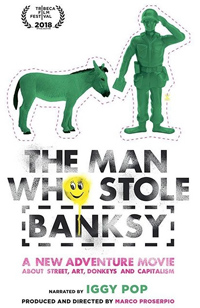Anti-American Graffiti: A Cultural Critique Built on Street Art

Marco Prosperio’s ambitious debut feature The Man Who Stole Banksy is a far-reaching plunge into the modern art world. Specifically, how the removal and auctioning of a four-ton Banksy wall-piece made of concrete became a microcosm of issues in art, law, international politics—and, perhaps most important of all, ethics. Thorny topics include the commodification of street art, the privatization of space, western artists invading minority cultures, the occupation of Palestine and—hold on, let me catch my breath. If this sounds complicated, that’s because it is. A must-see for art nerds, this is a rich, stylish documentary that favors intellect over narrative. Yes, it’s a wild ride, it entertains while it stimulates – but this is also the film’s Achilles’ heel: it’s so chock-full of info, it gradually loses focus. Even worse, the anonymity of its nominal artist further unmoors the story from any roots in human emotion. The filmmaker’s conceit is spot-on—but the subject might have fared better as an essay.
It all starts with Banksy’s Donkey Documents, an ill-positioned political statement in the city of Bethlehem. Many see Banksy as a visual artist-philosopher with pro-Palestinian intentions; others, including taxi driver Walid the Beast, see the donkey as an allusion to a common Palestinian insult—and lead the charge to take down the artwork. What we think will be Walid’s story, however, evolves into the dizzying odyssey of the four-ton wall as it travels from Bethelehem to Copenhagen to London to Bologna. The Man Who Stole Banksy certainly does its legwork; talking heads include artists, collectors, critics, historians, lawyers and thickly-accented locals, all of whom have their own theories. Meanwhile, the film stays objective, asking its essential question: if street art is ephemeral by nature, is defacing it, or appropriating it for private viewing by a select few really that amoral?
As far as docs go, The Man Who Stole Bansky is pretty stylized—and this approach works. For such heady subject matter, the tone is bracingly glib, including interview outtakes and amusingly self-aware narration by punk-rocker Iggy Pop. Visually, it approaches urban decay and concrete jungles with alien, almost ethereal perspectives. And when a group of men in breathing masks remove street art in Liverpool, we’re reminded of bank-robbers in The Town. In the background, a discordant soundtrack thrums with phantasmal synths akin to air sirens or banshees. Most fascinating are the film’s inventive transitions, where lyrical interludes of Palestinian street musicians add compelling symmetry to the doc’s line of moral questioning: are these stolen shots of local musical talents parallel to lifting street art? This is a stroke of genius.
In sum, Prosperio’s Banksy is a thought-provoking love letter to street art. Unfortunately, the film’s message turns abstract just when it should cement its intentions. As a result, the narrative doesn’t lag, but it doesn’t fly either; it’s an interesting companion piece to Banksy’s Exit Through The Gift Shop (2010), but one that wants to be more self-contained. When culture critic Carlo McCormick (who also appears in this year’s Basquiat doc, Boom For Real, another good companion piece) poses the question “What is of the people and what isn’t?” we wonder where the people are. Aside from Walid—plus two other impassioned characters with Mark Ruffalo energy—the human story is almost absent. Near the docu’s end, when it closes in on a character-driven moment, the drama feels unearned, too little too late. Far closer to the truth is the moment when a piece of graffiti reads ‘To be continued.’
Reviewed on April 20th at the 2018 Tribeca Film Festival – Documentary Competition. 90 Minutes
★★★/☆☆☆☆☆


